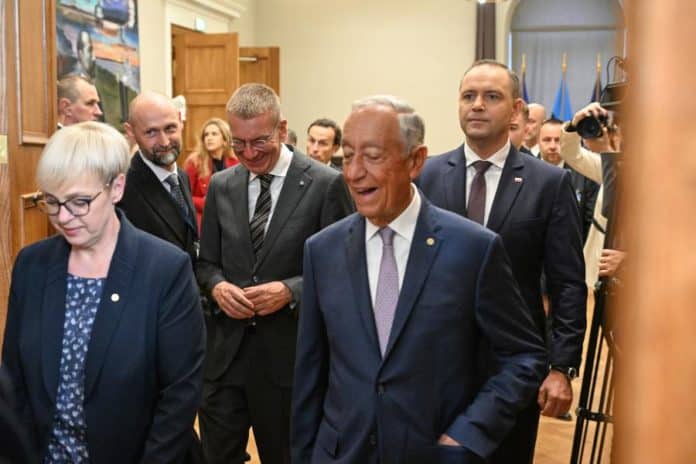Portuguese president, Marcelo Rebelo de Sousa, has welcomed the awarding of the Nobel Peace Prize to Venezuelan opposition leader María Corina Machado, saying it was a “very wise” decision.
“I would like to warmly congratulate the winner, because she has been a long-time fighter for democracy and freedom (…), she is a woman, a constant presence in the struggle, and she fights in very, very difficult conditions,” he said in Tallinn (Estonia), after a meeting of the Arraiolos Group – not a group of carpet weavers as the time might suggest but one of heads of state, with or without executive functions, from European Union countries that meets informally every year.
Marcelo emphasised the “very wise, very thoughtful decision, which is neither emotional nor sensationalised” – nor carried away by the media buzz of recent days concerning the peace plan underway in the Middle East. But he did admit to being “surprised by Washington’s reaction”.
The US government has criticised today’s decision, arguing that the prize should have gone to US President Donald Trump – and maintaining that the Norwegian Nobel committee “put politics ahead of peace”.
“I don’t even understand this statement (…) because it doesn’t make much sense”, Marcelo told reporters. “The US administration has recently taken positions on what is happening in Venezuela, claiming that it wants to contribute to peace, democracy and freedom in that country (…) there are different ways to contribute” to peace, and “one way is to recognise those who, in very difficult conditions, have tried to establish a space for political affirmation in their own country.
“It is a way of fighting for peace. Politics is also a means of fighting for peace,” he stressed, considering that “everyone should be happy” with this award and noting that, “ultimately, everyone reacts according to their own view of the world.”
Marcelo also believes the award “belongs to the Ibero-American world,” with Portugal following “this reality very closely,” not least because there is “a very, very strong Portuguese community” in the country – “the strongest foreign community in Venezuela.”
Regarding the award winner’s call for Portugal to provide greater support to the Venezuelan opposition, Marcelo noted that “the Portuguese state has, over time, maintained contacts with all Venezuelan political sectors, and both the minister of foreign affairs and the secretary of state for communities, in successive governments – I recall – have had contacts, both with the government (…) because it is important for those who want to maintain diplomatic relations, but also with the opposition.”
Thus, after days of fevered speculation, the Nobel Peace Prize for 2025 has been awarded, to Venezuelan opposition leader María Corina Machado, a former MP of the Venezuelan parliament between 2011 and 2014.
The Norwegian Nobel Committee made its decision on the basis of Machado’s “tireless work in promoting the democratic rights of the people of Venezuela and for her struggle to achieve a just and peaceful transition from dictatorship to democracy.”
“As a leader of the democracy movement in Venezuela, María Corina Machado is one of the most extraordinary examples of civil courage in Latin America in recent times,” the Committee emphasised.
As for Mr Trump, there is always next year – when the world will have found out if ‘one of the greatest days in the history of civilisation’ went on to bear fruit, and relieve the terrible suffering of so many people.
Source: LUSA



